#naoki urusawa
Text
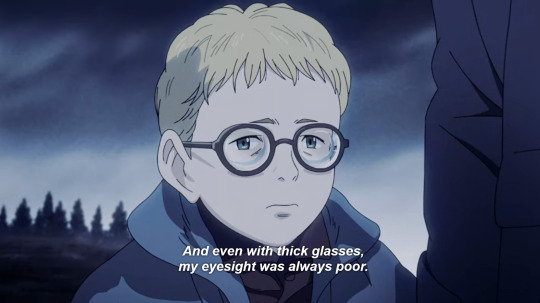
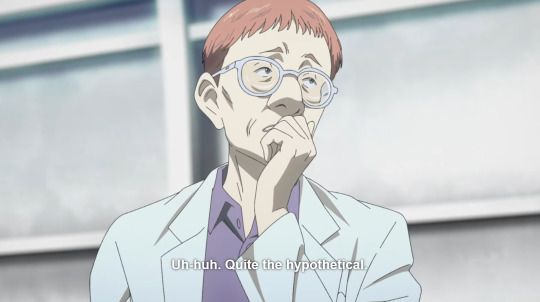
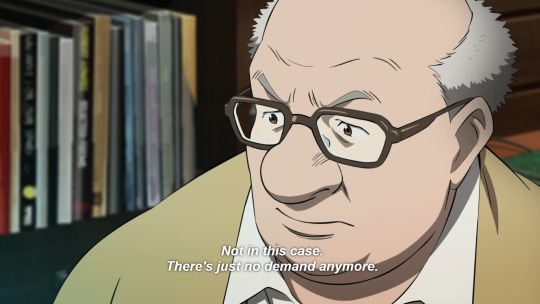
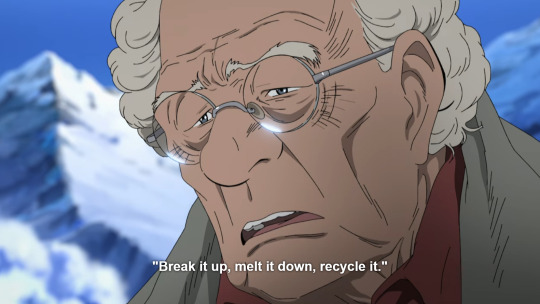
I love how in the Pluto anime they actually include the distortion from glasses lenses on characters that wear them and they even have different types of distortion to mimic the way lenses for both near and farsightedness would. It's such a neat bit of attention to detail that I don't think I've ever seen in another anime.
556 notes
·
View notes
Text
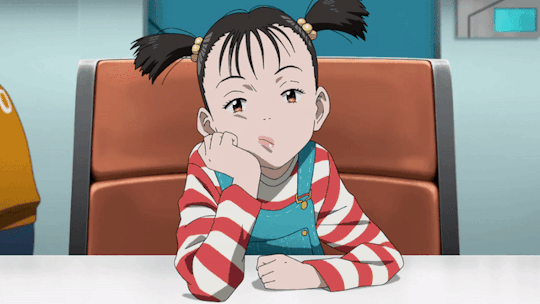
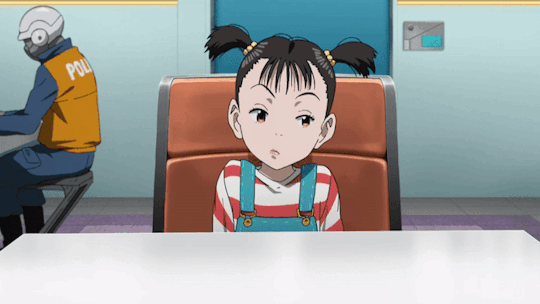

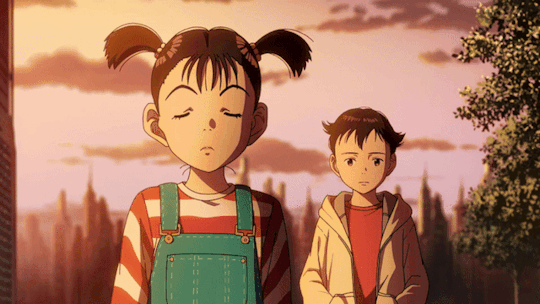





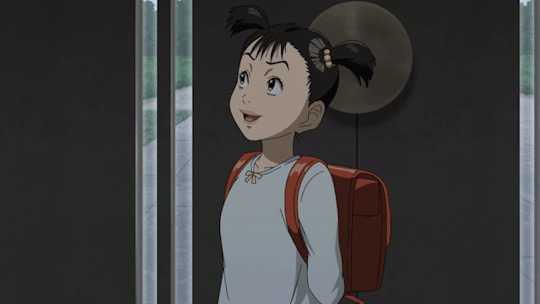
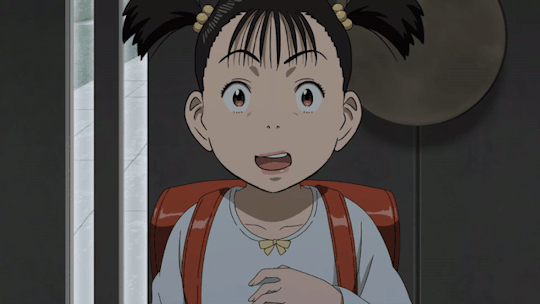

Uran being her usual silly self in PLUTO
562 notes
·
View notes
Text

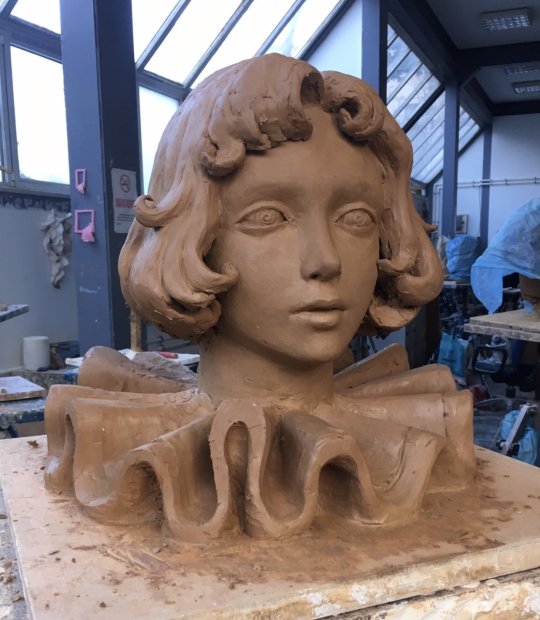
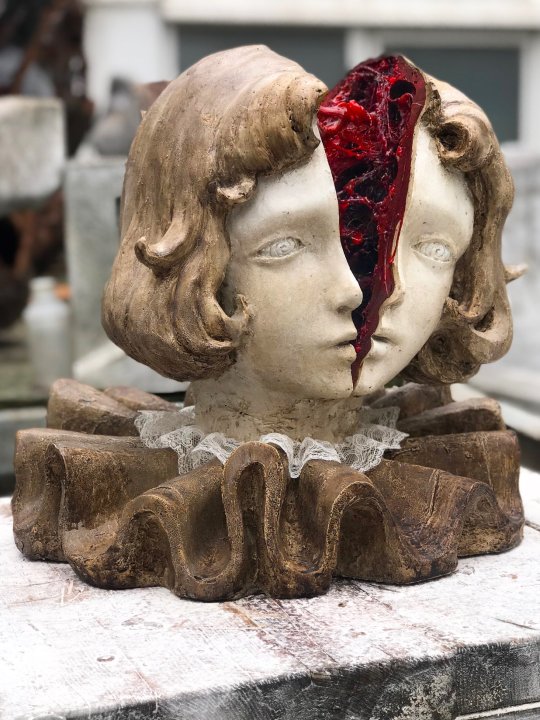





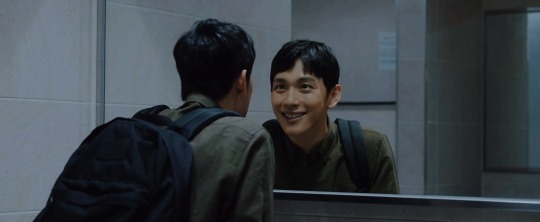
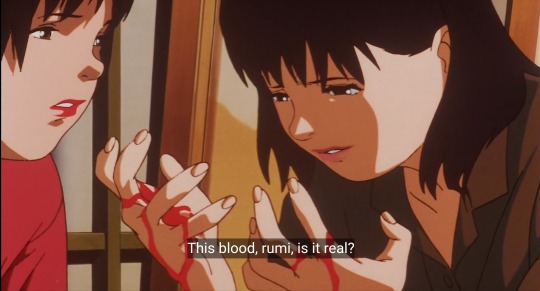


"...is this who I really am?" - Yoon Jongwoo, Strangers from Hell (2019)
[ Fyodor Dostoyevsky, Notes from Underground// untitled sculpture, ceydajeevas on instagram// Franz Kafka, The Metamorphosis// Strangers from Hell (2019), dir Lee Chang-hee// Bora Chung, Cursed Bunny// Monster (2004)// Hieu Minh Nguyen, Elegy for the First// Perfect Blue (1997), dir Satoshi Kon// Naoki Urasawa, Monster (1994-2001) ]
#web weaving#fyodor dostoevsky#notes from underground#franz kafka#the metamorphosis#strangers from hell#yoon jongwoo#bora chung#cursed bunny#monster#naoki urusawa#naoki urasawa's monster#hieu minh nguyen#perfect blue#quotes#words#literature#poem#poetry#hell is other people#yim siwan#johan liebert#parallels
798 notes
·
View notes
Text

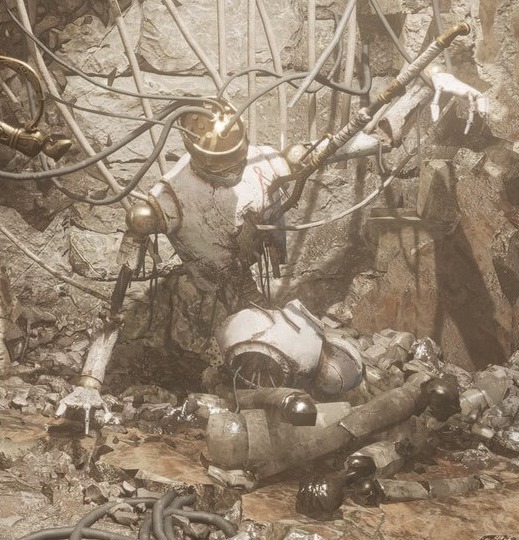
The first robot and puppet to kill a human
#Netflix Pluto#Lies of P#King of Riddles#Brau 1589#Naoki Urusawa#Netflix#Playstation 5#Arlecchino#manga#Anime#artificial intelligence#AI#Robot#Puppet#Pinnochio#Gesicht#Astro Boy#Astroboy#Pluto#Osamu Tezuka
395 notes
·
View notes
Text
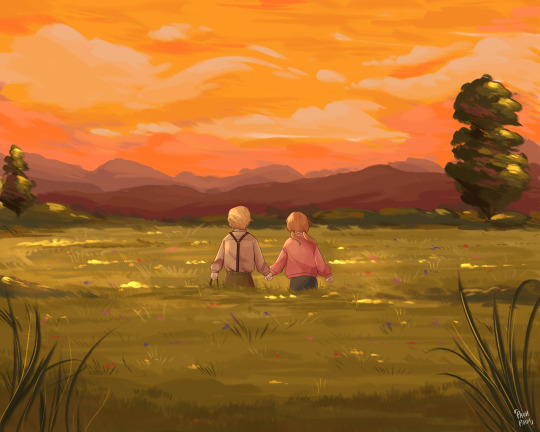
It's only Anna and me in this whole world
#monster#monster anime#johan liebert#anna liebert#nina fortner#kenzo tenma#naoki urasawa's monster#naoki urusawa#anime#illustration
529 notes
·
View notes
Text
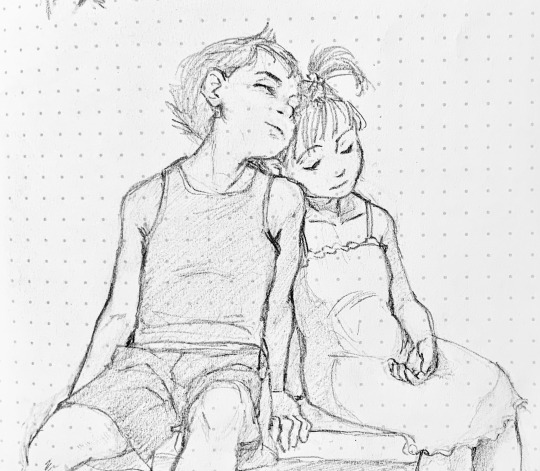
just gonna ignore the fact that Pluto’s Atom said robots don’t get sleepy 😴 let them nap!! And let me get excited for the Netflix anime adaptation >:D
btw thanks for 50 followers everyone! Glad to be in this corner of the internet.
#naoki urusawa#naoki urasawa's pluto#pluto#pencil#tetsuwan atom#astro boy#osamu tezuka#traditional art#anime#manga#atom#uran#pluto anime#Astro#sketch
486 notes
·
View notes
Text

#mangacap#naoki urasawa's monster#monster#manga#manga screenshots#naoki urusawa#johan liebert#manga screencap#manga panel#manga aesthetic#manga caps
1K notes
·
View notes
Photo
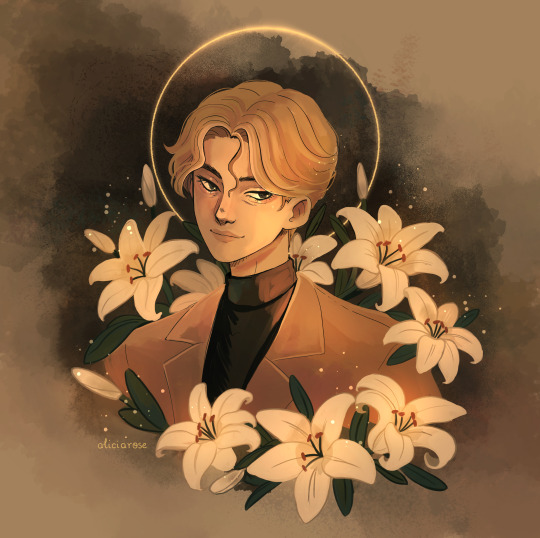
That boy is a Monster
679 notes
·
View notes
Text
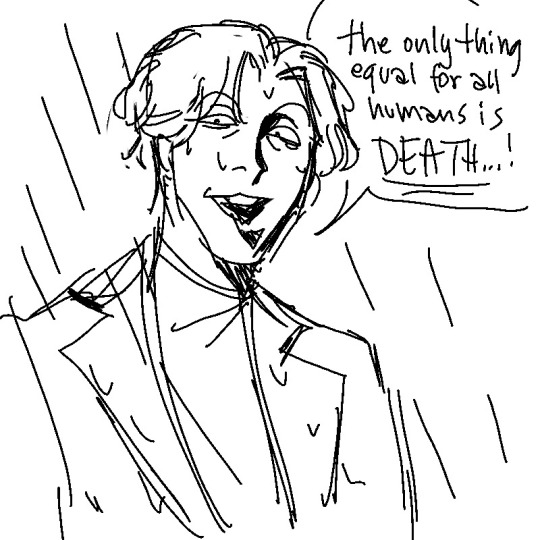
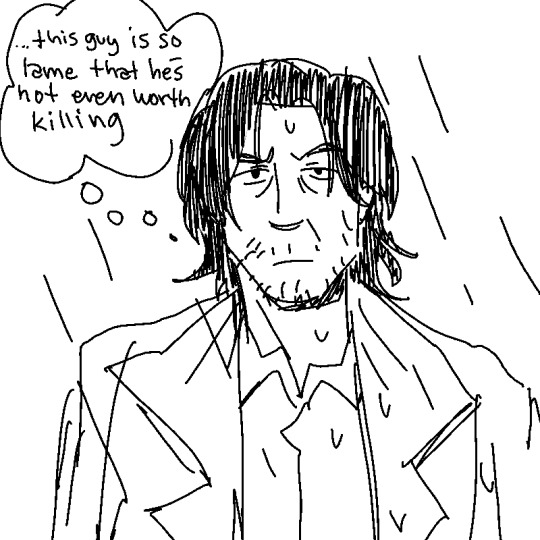
#johan is so cringe to me. you cannot fight me on this#naoki urusawa#naoki urasawa's monster#naoki urasawas monster#kenzo tenma#johan liebert#monster#shitpost
821 notes
·
View notes
Text
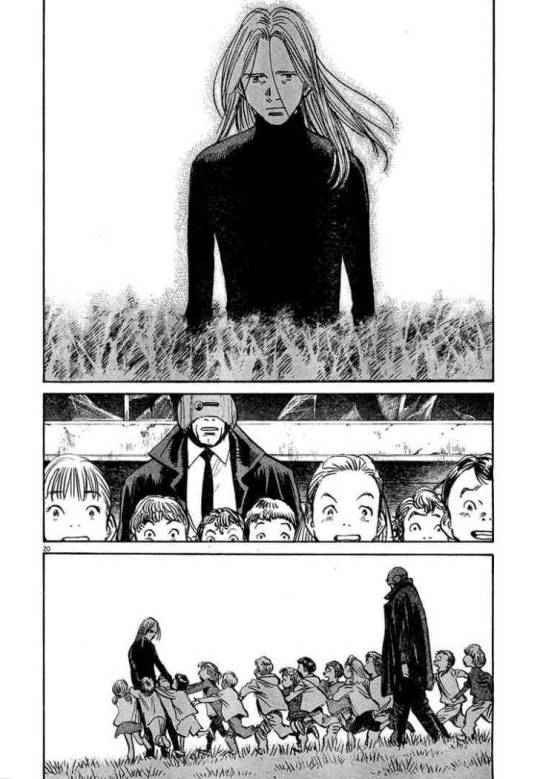
I love you Epsilon
178 notes
·
View notes
Text
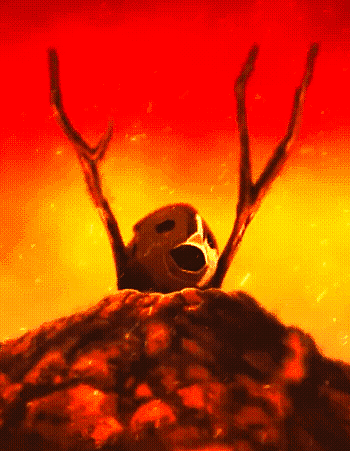
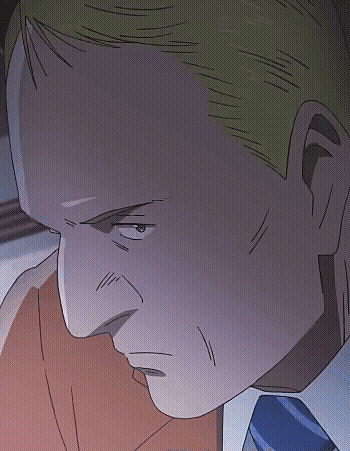

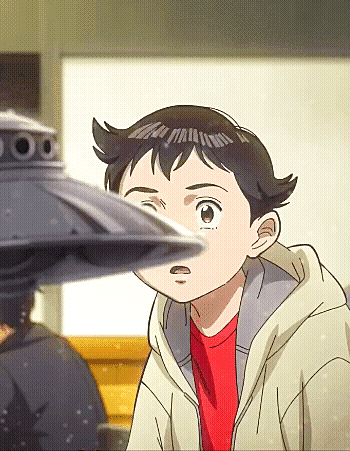

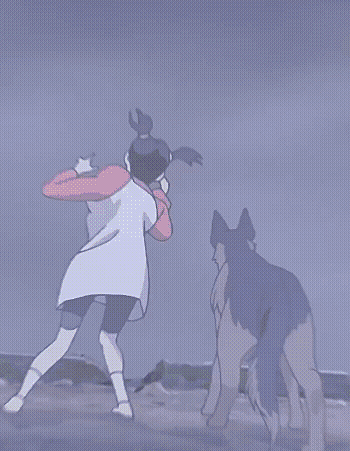
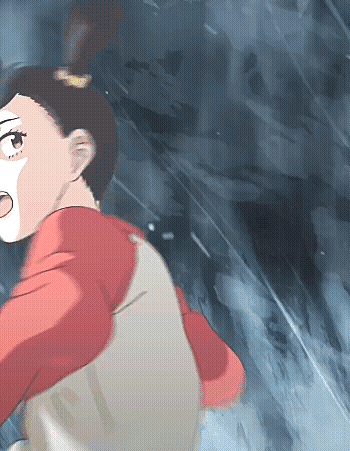
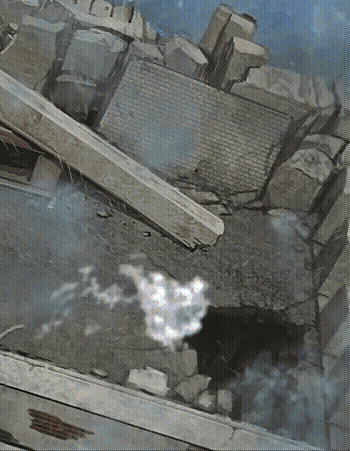
Pluto, directed by Kawaguchi Toshio. ©Naoki Urasawa x Osamu Tezuka / Genco, Studio M2, Tezuka Productions.
159 notes
·
View notes
Text

Dr. Tenma
#fanart#anime#monster manga#manga#monster fanart#monster anime#monster#kenzo tenma#tenma monster#naoki urusawa#naoki urasawa's monster
189 notes
·
View notes
Text
OKAY LISTEN
I absolutely LOVE the Pluto manga, not only does it give more Astro boy content as a whole but the anime adaption looks incredibly promising! AND I'M HYPED
BUT
The ONE, the ONE SINGLE thing that bugs me that I see some fans of Pluto do when describing Pluto is that it is Astro for adults, or that Astro is the kiddie version of Pluto AND AS A FAN OF BOTH MAKES ME WANT TO START TYING PEOPLE'S ARMS INTO PRETZEL KNOTS.
Not only because Astro boy came out FIRST as Pluto is a version of ASTRO BOY not the other way around, but because PLUTO took a dark part in the ASTRO BOY STORY and expanded on it in it's own unique and creative way, ASTRO AND PLUTO ARE BOTH DARK, BOTH ARE INCREDIBLY DARK, NEITHER ONE IS MORE "DARKER" THAN THE OTHER
There is so much darkness and tragedy in the original Astro boy series, but the difference between Astro and Pluto is that despite the tragedy Astro boy focuses a lot more on the positives of life, being able to live a happy life despite some of the negativity that surrounds you. That doesn't make it so it is less dark or more "for kids". Rather, it gives a sense of realism and hope, that you can live happy even if the world can be dark sometimes. And even though Pluto focuses on the more darker aspects of Tezuka's story, it has that same message of hope, Dr Oshay said it himself in the Pluto manga.
SO, THEY ARE BOTH EQUALLY GOOD AND EQUALLY DARK BUT THE MESSAGE OF POSITIVITY AND HEARTFELT AND HOPE AND FAMILY IS A HUGE ASPECT OF THE STORY. I HIGHLY RECOMMEND LOOKING INTO ASTRO BOY JUST AS MUCH AS I RECOMMEND YOU GIVE PLUTO A SHOT.
AND IF I HEAR *ONE* MORE PERSON SAY ONE IS DARKER THAN THE OTHER I *WILL* BE IN YOUR WALLS.
#astro boy#astro boy 1963#astro boy 1980#astro boy 2003#mighty atom#tetsuwan atom#pluto manga#pluto anime#pluto#osamu tezuka#naoki urasawa's pluto#naoki urusawa#mangaka#manga series#manga#anime series#anime shows#manga and anime#anime and manga#anime#pluto netflix#pluto series#pluto naoki urasawa
164 notes
·
View notes
Text

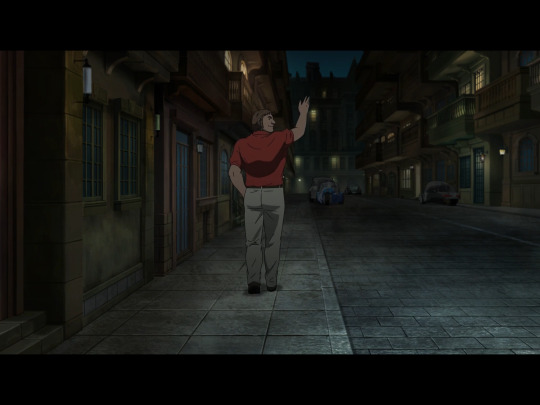
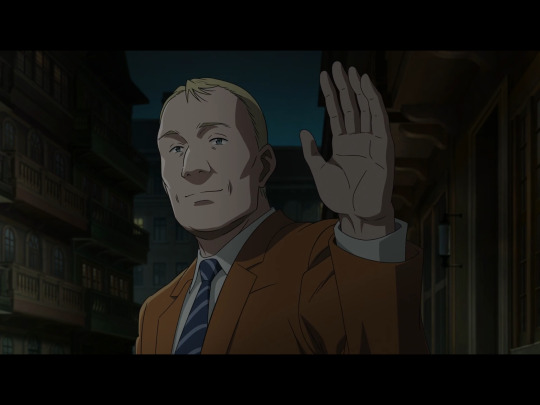

#gesicht#gesicht pluto#pluto gesicht#brandom#brandom pluto#pluto brandom#pluto#pluto anime#mybestaquotes#urusawa naoki#naoki urusawa#naoki urasawa#animecap#anime cap#anime caps#anime
108 notes
·
View notes
Text
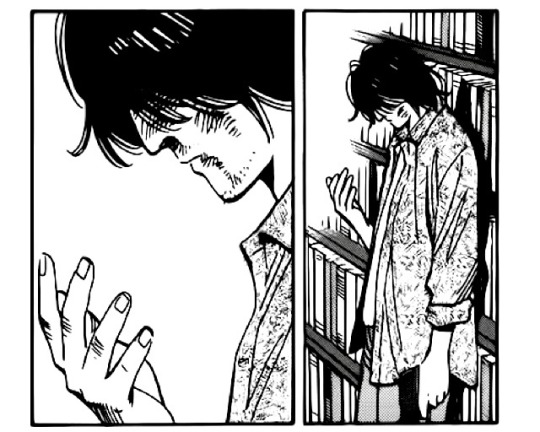
Monster (モンスター) // Naoki Urasawa
261 notes
·
View notes
Text
A nonexistent human being. Or is he? (character analysis of Johan Liebert)
A few months ago I’ve read a book which was recommended by one of the Monster’s fans, - “The Divided Self” by Ronald David Laing. He suggested Laing’s work to everyone who’s confused about Johan’s mindset and motivations, just as I’m sure a lot of us were… It was a GREAT recommendation, so insightful that I wanted to share my thoughts and the interpretation I developed.
Any blockquote in this post is from “The Divided Self”, there will be too many to sign each of them, so just keep that in mind :)
It’s going to be a painfully long read, but hopefully a rewarding one too.
PART 1: DEFINITION OF ONTOLOGICAL INSECURITY, TRUE AND FALSE SELF
Firstly we need to get familiar with a few concepts from Laing’s work which will be important for understanding the rest of the essay. His book describes schizoids and schizophrenics, exploring the mechanisms behind their illness. But it is important to understand that he, although a psychiatrist, acknowledged mental illness primarily as an existential/philosophical problem rather than a purely medical one. He saw more value in understanding the patient's experience of the world rather than endlessly examining and manipulating their body.
The first term we will need is ontological insecurity. Let's compare how Laing describes someone who is confident in his own reality - and someone who is not.
The individual, then, may experience his own being as real, alive, whole; as differentiated from the rest of the world in ordinary circumstances so clearly that his identity and autonomy are never in question; as a continuum in time; as having an inner consistency, substantiality, genuineness, and worth; as spatially coextensive with the body; and, usually, as having begun in or around birth and liable to extinction with death. He thus has a firm core of ontological security.
<...>
The individual in the ordinary circumstances of living may feel more unreal than real; in a literal sense, more dead than alive; precariously differentiated from the rest of the world, so that his identity and autonomy are always in question. <… > He may feel more insubstantial than substantial, and unable to assume that the stuff he is made of is genuine, good, valuable. And he may feel his self as partially divorced from his body.
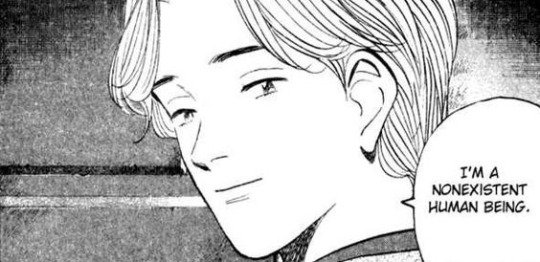
If a position of primary ontological security has been reached, the ordinary circumstances of life do not afford a perpetual threat to one's own existence. If such a basis for living has not been reached, the ordinary circumstances of everyday life constitute a continual and deadly threat.
For an individual who’s unsure of his own existence, life becomes a constant struggle to preserve his self. All efforts are made to avoid engulfment, implosion, petrification. Fear of being absorbed is essentially fear of being understood, caught up, seen, loved, "grasped".
To be understood correctly is to be engulfed, to be enclosed, swallowed up, drowned, eaten up, smothered, stifled in or by another person's supposed all-embracing comprehension. It is lonely and painful to be always misunderstood, but there is at least from this point of view a measure of safety in isolation.
The way to deal with this fear is to take one’s true self out of the real world, completely out of reach of other people. A true self withdraws into the depths of the inner world, its connection with an individual’s body is interrupted. That which interacts with the "outside" world and controls actions, movements, words, facial expressions is the false self. A carefully falsified image designed to deflect the gaze of others.
…[he] never allows himself to 'be himself in the presence of anyone else. He avoids social anxiety by never really being with others. He never quite says what he means or means what he says. The part he plays is always not quite himself. He takes care to laugh when he thinks a joke is not funny, and look bored when he is amused. <…> No one, therefore, really knows him, or understands him. He can be himself in safety only in isolation, albeit with a sense of emptiness and unreality. With others, he plays an elaborate game of pretense and equivocation. His social self is felt to be false and futile. - Laing describing his patient
However, another fear, of petrification, or objectification, clashes with the previous one. Fear of being absorbed makes one flee from the gaze of others, but by hiding from it, an individual ceases to be perceived by anyone, which once again puts their substantiality into question. An individual is very much afraid of being perceived by others as an object, as something inanimate, as a machine, as an “it” without subjectivity. It’s as if any potential observer is Medusa, who can instantly turn an individual to stone with a mere gaze. This fear pushes a person to "existential suicide" - he pretends to be "dead", giving up his own autonomy before someone else can deaden him and treat him as an inanimate object. Also, as a way of protecting himself, an individual might turn everyone around him into stone too - because a phantom, hallucination, or an object couldn’t harm him, only real human beings are capable of such.
Fear of implosion is the same as fear of absorbing the real experience of life. An individual is empty, he is a vacuum - but this vacuum he begins to think of as himself. Any substantial relationship with the world and people threatens to "tear" him, so he avoids it, too.
Now let’s clarify what is false self, how it relates to the true one and the world.
If the individual delegates all transactions between himself and the other to a system within his being which is not 'him', then the world is experienced as unreal, and all that belongs to this system is felt to be false, futile, and meaningless.
Here’s an illustration from “The Divided Self” to better visualize what is meant here.
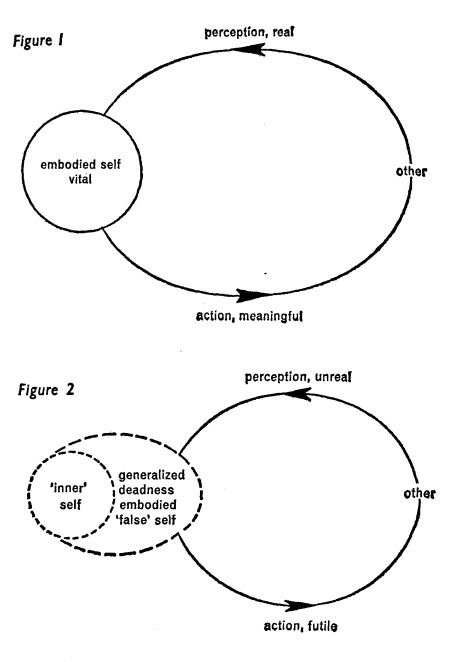
The reality of the world and of the self are mutually potentiated by the direct relationship between self and other. In Figure 2, there is a vicious circle.
the person who does not act in reality and only acts in phantasy becomes himself unreal.
The true self resides in an imaginary, devoid world of phantoms. It becomes unembodied, not represented in the real world. The real world, in return, loses its vitality in the eyes of a schizoid, viewed now as filled with objects.
The false self is a mask, a performance, an imaginary identity with little or nothing to do with the true self of the individual. Laing describes cases in which the false self starts to emerge in childhood and such children are described by their parents as remarkably obedient, compliant, undemanding. They conform perfectly to the expectations of the family and the environment. They begin to mockingly imitate what is desired of them. This is not necessarily an absurdly "good" image; it can also be absurdly evil, if that is what the world wishes the individual to be.
The point of having a false self is to not let any part of the true one slip to the real world, where an individual has no power over what will be done to it. To give something about him away is to rely on others mercy, and it’s a risk a schizoid can't afford.
in reality, in 'the objective element', nothing of 'him' shall exist, and no footprints or fingerprints of the 'self shall have been left.
Now to the interesting part - how all of that correlates to Johan.
PART 2: ROOTS OF JOHAN’S ONTOLOGICAL INSECURITY
Firstly, of course, dressing up as a sister. He probably could sense already that it’s done for a reason, not for the fun of it. The family led “a quiet life”, which is probably difficult to do with two kids. So, my suggestion: the twins grew up with the feeling that they have to hide from some sort of danger and avoid attention. But, Anna didn’t have to hide her real appearance, unlike Johan, for whom pretending to be someone else became an important part of remaining safe.
Did he conceal as someone else, or was he only an imposter for the real human that for sure is present in the world?
Because everyone, besides mother and sister, only knew the sister, the girl, the daughter. She was definitely real. Was he really ever there?
Even the mother couldn’t tell them apart. He became an illusory twin.
The moment their mother hesitated could only solidify Johan’s intrusive thoughts. She had someone in mind, could it be that she hesitated because at that exact moment couldn’t tell where the kid she’d given up?
Did he only stand a chance to live, physically and existentially, only if he concealed as someone else? Because if people could see him for what he truly was, he would not be saved.
My guess is that Johan's perception of himself was so distorted that he no longer thought of himself as the real thing; that the true self worth protecting wasn’t inside of him, it was his sister, and he was fake in his entirety. He was a mere pretender who had to ward off danger from the true self. Johan's saying "I am you, and you are me" and referring to Anna as "my other self" indirectly confirms my assumption - he began to see himself and his sister as an integrated system, where he is nothing more than a facade and his sister is the living, real, substantial, human one.
The mother's hesitance in choosing between the two children added fuel to Johan's already flimsy sense of his own substantiality. What if she was not choosing between the twins, but simply could not at that moment figure out which one was which? Keeping a particular child in mind, she just couldn't tell who was really the kid she was thinking of and who was posing as such? Where is the real child and where is the false one?
The feeling of insecurity, the loneliness, the pain of their mother's abandonment, the sympathy for this sister, and the enormous guilt that the real one of them two had fallen into clutches of monsters. The twins' whole life consisted of constant attempts of intruders to destroy their lives and identities.
The days after Anna’s return prior to being found on Czech-German border mark Johan’s existential death.
Something in him collapsed in that interval of time. When his mother was choosing between them, he was still a normal child (or, at least, nothing described in manga showed us his abnormality) - afraid of being abandoned by his mother, of being handed over to be torn apart by sinister strangers whose intentions were unknown, but from whom he’d been running for as long as he could remember. All these feelings died in him. When and how exactly, we don't know, but a completely different Johan crosses the Czech-German border - detached, horrifyingly tranquil, indifferent to death. In a sense, he no longer has anything to fear, the short chain of events has been so devastating that he unknowingly committed existential suicide. Even if it’s death that’s awaiting them, no one will be able to put their hands on them, no one will be able to twist their souls and minds.
Laing’s patients often described their inner world as a wasteland, devoid of any sign of life. There are quotes from his book in which Laing talks about his patient and cites his words:
The self becomes desiccated and dead. In his dream world James experienced himself as even more alone in a desolate world than in his waking existence, for example:
“.. . I was standing in the middle of a barren landscape. It was absolutely flat. There was no life in sight. The grass was hardly growing. My feet were stuck in mud… ”
“. .. . I was in a lonely place of rocks and sand. I had fled there from something; now I was trying to get back to somewhere but didn't know which way to go… “
Reminds us of something, doesn’t it?
And it’s a precise reflection of Johan's world, the real Johan, where his self ended up imprisoned. However, he was a little luckier than the other schizoids - there was room for one more person in his world.
Mentally, Johan never made it out of that wasteland, only his body was saved. He calls this landscape a scenery of the Doomsday, not only because his body was close to death in that very space, but because it so strongly resembled Johan's inner landscape. It was the last place his soul has seen.
PART 3: KINDERHEIM 511 AND THE LIEBERTS
One’s true self, residing in a world of phantoms, ceases to engage with the real world through the individual's body. What is this body occupied with meanwhile?
Instead of being the core of his true self, the body is felt as the core of a false self, which a detached, disembodied, 'inner', 'true' self looks on at with tenderness, amusement, or hatred as the case may be. <…> The unembodied self, as onlooker at all the body does, engages in nothing directly.
This offers an answer as to why Kinderheim didn’t have the same destructive impact on Johan as it had on other children. His true self was already out of reach, it couldn’t be obtained no matter what they did to him externally.
They could get nothing from him. "They could only beat me up but they could not do me any real harm." That is, any damage to his body could not really hurt him.
In a sad way, the experiments on Johan's psyche were not successful, for he himself, quite unknowingly, subjected himself to all the horrors to which the Kinderheim warders were about to subject him.
You cannot kill what is dead, drain what’s empty, objectify what’s inanimate. That's why they didn't make it.
But Johan, of course, is the result they strived for but couldn’t achieve: a human so terrified and defenseless that is pushed to abandon his sensitivity in order to survive.
Thus, to forgo one's autonomy becomes the means of secretly safeguarding it; to play possum, to feign death, becomes a means of preserving one's aliveness. To turn oneself into a stone becomes a way of not being turned into a stone by someone else.
It seems to me that Johan was ready to settle down and stop running after escaping Kinderheim 511. But he left the orphanage with a critically dangerous revelation - sometimes it’s either you, or everyone else; his actions clearly show that he won’t hesitate to obliterate everything and everyone if it ensures safety. I just don’t think he expected to find himself in a similar position so soon, when he was adopted by Lieberts.
The thing about him is that he played along, he became what the world wanted him to become, yet it wasn’t enough to finally be left alone. The man they ran away from showed up at their doorstep and Johan lost his temper. Nothing helped the twins to escape monsters - living under different names, with different caregivers, in different places, together, separated- NOTHING was ever enough.
Maybe it was around the time his plan to be the last one standing was formed. Wiping out every sparkle of life from the world was the last attempt to gain safety.
Johan doesn’t care much about dying because his existential death has already happened, he already feels a lot more dead and frozen than alive. He already convinced himself that there’s nothing true about him, and out of two of them his sister is the true self. It doesn’t matter if he dies, he was never there from the start. But even after the gunshot he hopes to live through his sister.
Everything that comes after that wretched rainy night is an attempt to secure himself and his sister from the world that was on their tail for as long as they lived. He is ready to be separated from her and let her live under a different name if that’s how the monster finally loses track of her; he’s ready to enter the underworld, to take control of the German economy, to kill people.
It seems to me, because of the confinement of his true self in the realm of insubstantiality, he became unable to perceive people from the real world as alive and autonomous, that’s the sad reason why he could kill so easily. What he saw around were ghosts, objects that were mimicking human beings, not actual humans.
But there were exceptions.
Only Anna and Tenma are shown together with Johan in the wasteland of his inner world, where his true self dwells - them being there with him is a way of telling us, readers, that only these two truly know Johan. And therefore, only they can be spared.
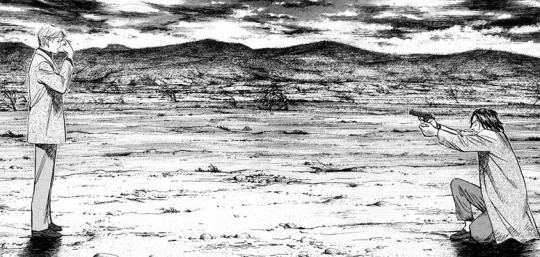
I just want to emphasize: for Johan, “destroying the world” and “be the last one standing” wasn’t something he did for fun, or just because he could. It’s the last endeavor of a tortured child convinced in hostility of all living things to find peace.
PART 4: THE TALE OF THE NAMELESS MONSTER
The self is, however, charged with hatred in its envy of the rich, vivid, abundant life which is always elsewhere; always there, never here. The self, as we said, is empty and dry. One might call it an oral self in so far as it is empty and longs to be and dreads being filled up. But its orality is such that it can never be satiated by any amount of drinking, feeding, eating, chewing, swallowing. It is unable to incorporate anything. It remains a bottomless pit; a gaping maw that can never be filled up.
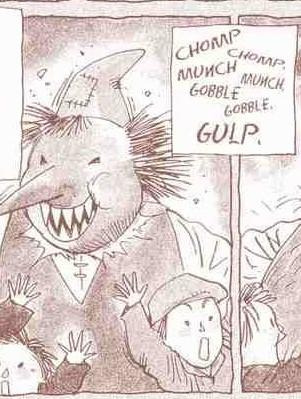
In the tale of the nameless monster, Johan can be both the monster and the boy who has been possessed by a foreign entity. That depends on how you interpret it.
This tale could be an allegory for what is happening to the twins, which are represented as nameless monsters. Johan could not remain himself, all the time hiding under different "faces'', changing names and identities. However, he couldn’t stay in any of them for long. His nature was bursting out, destroying these masks and whatever and whoever was around in the process. Nina on the other hand, even knowing her past, accepted the truth. Accepted her mother's choice and hardships she had to endure. She no longer tries to appear to be someone else, having chosen to move on with her life.
A second interpretation: Johan-the-Prince and our Johan are both weakened boys on a brink of death. For each of them, letting the Monster in, something scary, unnatural to humans, was a way to survive. So our Johan suppressed his sensitivity and susceptibility by pretending to be a not-quite-human, until traces and even references to his humanity have all but disappeared.
I don't think the fairytale manipulated Johan as a child, messing up his consciousness. What’s truly sinister about this picture book is that it foretold his fate.
As an adult, he picks up this book and sees himself in both the monster, who could not bear the present self and took on another's form, and the boy, who in an attempt to survive has ceased to be human, has destroyed everything around him. All that remains is solitude.
Imageries of the prince and the monster merge into one, and in one thing they are similar - in a fear of losing their lives, they lied primarily to themselves, and that lie destroyed the being of each of them. Neither monster nor prince really saved what they were protecting so desperately.
In addition, the book itself was an object from Johan's distant childhood, now almost forgotten, and served also as a reminder of the times when he was an ordinary, normal child.
Johan was wearing masks all the time, but the greatest of all his deceptions was not to live under the names “Johan Liebert”, “Franz Heinau”, “Erich Springer”, or any other for that matter. The most atrocious lie was to wear a mask of the nameless monster, even convincing himrself that this is who he is, that the emptiness and void is all there is to him. Wearing the guise of the nameless monster for years he had almost lost every memory of being human, and the book in his hands was a painful, violent reminder of his cowardly self-deception, his abandoned humanity, his forgotten self.
PART 5: I AM NOT YOU, AND YOU ARE NOT ME
From the moment the book falls into his hands, Johan probably realizes that his worldview is very much distorted. One of his fundamental beliefs about himself has been undermined, so debunking the rest of his illusions becomes a priority.
He remembers orchestrating the massacre at Kinderheim, but his belief that he was always capable of such things is shaken. He suspects that in his lost memories he will find the answer to the question he didn’t even think of asking. If he wasn’t born a monster, how did he become one?
We are not allowed to listen to the entire contents of the tape from Kinderheim 511. Only his attachment to Anna becomes apparent from it; but maybe he proceeds to talk about the Red Rose Mansion next. During interrogation he could recall his sister's words, which he heard again and again after her return. Her story was told in the first person POV: “I saw <....> I heard <…> I was <...> I ran <...>”. On recording he could repeat verbatim the words of his sister, and then, as an adult listening to it, misunderstand the meaning of those words. After all, he heard himself saying “I was taken <...>, I saw people die <...> , I ran away…” And only on the basis of this would he latch on to the story about the Red Rose Mansion as an explanation for what he had become.
Johan then decides to destroy the place. Although he clearly doesn’t recognize it, it doesn’t ring the bell yet.
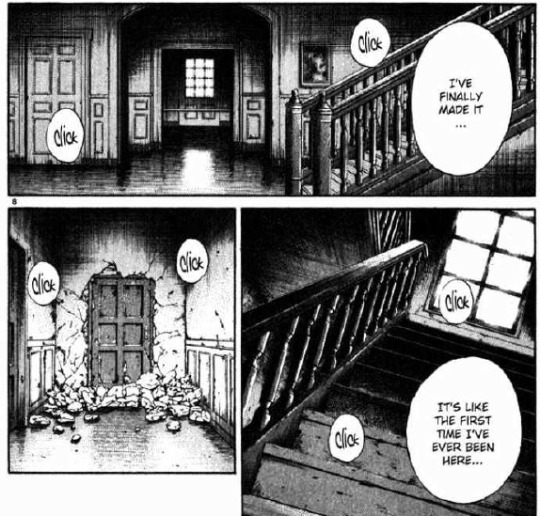

Johan at that moment still considers himself a single set of personalities with his sister, and believes that in his mother's eyes they looked the same.
I can only assume that he told Čapek that Nina would kill him because he mistakenly thought that Nina held the same opinion about their connection as he did. If he's willing to kill for her, she'll do the same. Of course, he was wrong: he saw himself as an extension, a shadow of his sister, taking her joy and pain as his own; Nina, as much as she loved her brother, did not see herself and him as one, and clearly drew boundaries between her being and Johan's.
The capacity to experience oneself as autonomous means that one has really come to realize that one is a separate person from everyone else. No matter how deeply I am committed in joy or suffering to someone else, he is not me, and I am not him.
The assumption of being taken away by Bonaparta and being cast aside by his mother was one of the last crutches guarding him from the horrifying truth - he was the one who turned himself into a monster.
He cries when he hears Nina's story. Realizing that they’re not one, and she has never perceived Johan in this way. She is not his true self, and he is not his sister's false self. He sees more and more clearly the outlines of the true self within him, and he does not like the picture emerging before him at all.
All the “saving” he was doing turned out to be a sham that didn’t bring any of the twins the expected result. He experienced the guilt of denying himself existence and grew so enraged that he decided to kill himself. He now saw his true self - destructive, without a good reason. And realized it had to be eradicated, along with the man, the Monster, who made him that way - Franz Bonaparta.
PART 6: RUHENHEIM
The final stage of Johan's collapse, the massacre at Ruhenheim.
When he gets to Bonaparta's old house and finds numerous sketches of him and his sister as children he understands that Bonaparta was not “a monster outside of him”.
He refers to him as such when meeting Čapek, implying that Franz is to blame for him becoming a murderer. Upon seeing these sketches he recognized that Bonaparta's intentions had changed greatly over the years, and both Anna and himself were able to escape their fate because of his suddenly awakened sympathy. Not that this excuses Bonaparta, he was the one who designed the experiment after all. But these sketches were a confirmation of his kind intentions towards the twins, whatever they may have been at the outset.
It turns out that when Bonaparta came to visit the Lieberts, he was no longer a threat to Johan and Anna. Johan now knew that the night he shot the Lieberts had indeed stumbled and made a fatal mistake which tore him apart from Anna and plunged him deeper into the abyss of despair.
The event that finally convinced him of the animosity of the world and the lack of a safe corner anywhere in it was a figment of his mind which was led by fear.
This discovery was the final straw for Johan. Any image he had of himself collapsed for good.
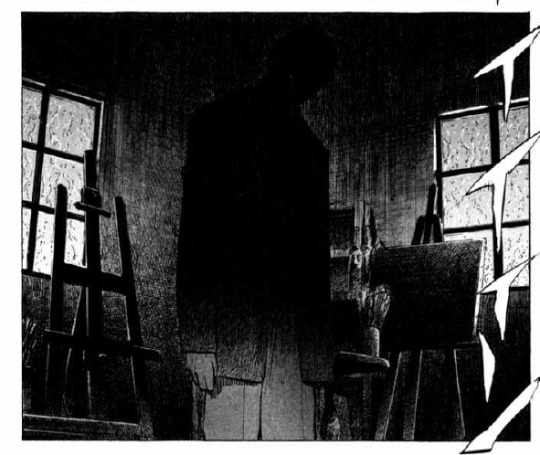
The ending of "Monster" is Johan's realization of the fact that he undoubtedly Is. He exists, he is real, and he is him. And he was among the people who denied him the right to live; he was incapable of standing up for himself and recognizing his right to life, as his sister managed to do. He was so eager to erase any traces of himself from the world that didn’t notice the huge trail of blood dragging behind him, that was solid evidence of his existence, the only thing he had left.
He didn’t need to do horrible things that only left him and Nina traumatised. That left him all alone, miserable, separated from her.
He tried so hard to evade the evil people that he killed his Self before anyone had a chance to lay a hand on it.
When he set out to be nothing, his guilt was not only that he had no right to do all the things that an ordinary person can do, but that he had not the courage to do these things over and against and despite his conscience which sought to tell him that everything he did or could do in this life among other people was wrong. His guilt was in endorsing by his own decision this feeling that he had no right to life, and in denying himself access to the possibilities of this life.
After everything he learned about his past, Johan can’t forgive himself. For throwing himself into oblivion, for locking himself in the darkness. For making himself a monster that he was not born to be, that he had a chance not to become.
He was just as capable and deserving of normal life and real, deep connection with others as any other human being. He just convinced himself that he wasn’t one, and nobody dared to contradict him.
There is a desire in him to preserve not only himself from being consumed, but also those he cares about from himself. He thinks of his love as disastrous - because of it, Anna lost her brother and adoptive parents. Tenma, who saved him, was forced to be on the run for several years after becoming a murder suspect.
If there is anything the schizoid individual is likely to believe in, it is his own destructiveness. He is unable to believe that he can fill his own emptiness without reducing what is there to nothing. He regards his own love and that of others as being as destructive as hatred. To be loved threatens his self; but his love is equally dangerous to anyone else. His isolation is not entirely for his own self's sake. It is also out of concern for others. <…>
…what the schizoid individual feels daily. He says, 'It would not be fair to anyone I might love, to love him.' <…> He descends into a vortex of non-being in order to avoid being, but also to preserve being from himself.
He wishes to die now more than ever - a real death, this time. Not just existential, but total. The true end, as he called it.
Appearing in front of Bonaparta and Tenma, he doesn't aim at Franz, because he no longer blames Bonaparta for what he has become.
Johan said the only thing everyone is equal in is death, and what was behind his words: he says to Tenma that not everyone is worthy of saving, of being loved and forgiven, and Tenma should've finally realized this after meeting him and really knowing him. Because he's a monster, and being cheerful, having hope and light in their life is something that others can have, but he can’t; he's completely out of this human world and the only thing he has in common with everyone else is that they are mortal and so is he.
But even in his death he is mistaken. Once again believing he has no right to exist, he hopes to laugh at the world one last time, and die at the hands of the man who once saved him. After all, he certainly wouldn't have done it, knowing what Johan would grow up to be.
Isn’t that right, Dr. Tenma?…
Nina forgave him and the man who saved his life long time ago doesn’t regret his choice anymore and commits to it. The only people dear to him have recognized his right to live, whatever he may be.
Alas, how this affected him, we don’t know, and all we’re left with is speculation.
As a sentimental person, I want to believe that it meant something to Johan.
But what I really don't doubt is that Johan by the end is a completely different character to the one he used to be. Broken, disarmed, miserable. But it’s finally truly him.
"I think I must have figured out how the show ended. The Magnificent Steiner, he probably, became human again."
PART 7: THE FINAL ESCAPE

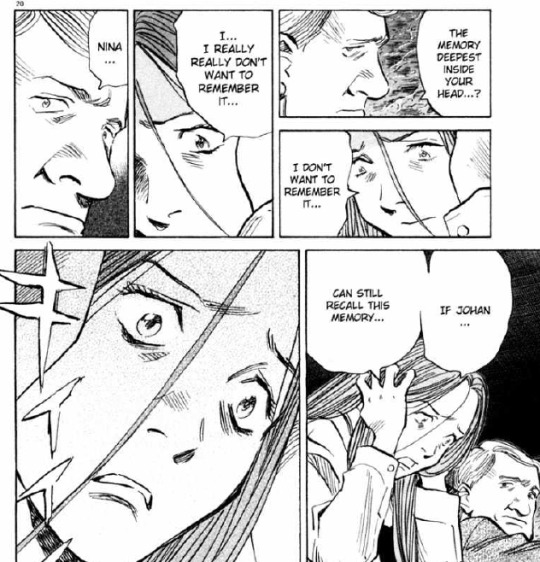
A mother plays a huge role in the development of her children's ontological insecurity - sometimes by being outright dismissive, sometimes by simply enjoying the child's undemanding and calm nature.
Here's what you can read about the mother’s impact in “The Divided Self”, those are Laing's reflections and descriptions of several of his patients.
... we suggest that a necessary component in the development of the self is the experience of oneself as a person under the loving eye of the mother.
His own feeling about his birth was that neither his father nor his mother had wanted him and, indeed, that they had never forgiven him for being born. <…> He was treated as though he wasn't there.' For his part, not only did he feel awkward and obvious, he felt guilty simply at 'being in the world in the first place'. His mother had, it seems, eyes only for herself. She was blind to him. He was not seen.
She had a great deal to say about her mother. She was smothering her, she would not let her live, and she had never wanted her.
Johan’s mother's choice was the first one in the long list of his miseries, it also triggered his ontological insecurity. And how could it not arise when the mother herself abandoned one of her children?
However, Johan was unaware that his mother had thought up names for the two of them, even before he and Nina were born. It turns out that the arrival of the second child was not an unpleasant surprise to her, she was looking forward to having them both.
She had always acknowledged the existence of both her children, and in her eyes they certainly weren’t a one big entity divided by chance into two bodies, one of which was never meant to be there.
But Johan looks truly disturbed after listening to Tenma. And this new revelation could also be another beginning to despair.
There is a door that must not be opened. What lays behind it: a paradise, or another monster?
Tenma, by telling him that the mother had given names to both of them, might have brought Johan down to a new hell. Where the mother recognised the reality of both her children and yet seriously chose which of them to keep.
This sort of thing doesn’t happen in real life, but since it’s fiction we’re talking about, I think we should pay attention to the fact that Johan wakes up only after hearing Tenma’s words. There is a symbolic meaning of him being stuck between life and death for so long.
It’s like he was resisting to be alive again, refusing to stay awake, choosing to be in a coma rather than walk this Earth again. But yet he didn’t die - a part of Johan was holding onto life despite all the horrors it brought to him.
In his last waking moments, he was miserable after discovering all the truth about himself. He really wanted to die, he thought it was the only thing he was deserving of; but Tenma didn’t shot him, his sister forgave him - and it wasn’t the outcome he expected at all. It started an inner conflict he didn’t have the time to resolve.
Johan as well could see the memory of mother’s choice in a different light. By opening up to Tenma he admitted it as a serious enough cause for him to abandon his humanity, as he really was living in a world full of threats. Hiding and pretending came natural to a child that didn’t know any better. And his mother, however hurtful her choice was and how wrong was the very fact of it, loved both of her children, Johan knows that for sure now. Maybe, he could finally forgive himself for becoming a monster. There was no one left to blame for the way he had turned out, no one to take revenge on - even himself.
(I know it can be confusing, so I’ll clarify, just in case - by “forgiving himself” i don't mean he simply dismissed the damage he did to others. He could only forgive the one he, with his own hands, inflicted upon himself, finally realizing, he had no other choice in his circumstances.)
He had a chance to accept that he had the right to exist all along, from the very beginning.
Finally, I want to get into the last excerpt from Laing's book. These are his patient's words from their conversation.
I could only be good if you saw it in me. It was only when I looked at myself through your eyes that I could see anything good. Otherwise, I only saw myself as a starving, annoying brat whom everyone hated and I hated myself for being that way. I wanted to tear out my stomach for being so hungry.
<…> Everyone should be able to look back in their memory and be sure he had a mother who loved him, all of him; even his piss and shit. He should be sure his mother loved him just for being himself; not for what he could do. Otherwise he feels he has no right to exist. He feels he should never have been born. No matter what happens to this person in life, no matter how much he gets hurt, he can always look back to this and feel that he is lovable. He can love himself and he cannot be broken. If he can't fall back on this, he can be broken. You can only be broken if you're already in pieces. As long as my baby-self has never been loved then I was in pieces. By loving me as a baby, you made me whole.
<…> It was terribly hard for me to stop being a schizophrenic. I knew I didn't want to be a Smith (patient’s family name), because then I was nothing but old Professor Smith's granddaughter. I couldn't be sure that I could feel as though I were your child, and I wasn't sure of myself. The only thing I was sure of was being a 'catatonic, paranoid and schizophrenic'. I had seen that written on my chart. That at least had substance and gave me an identity and personality. [What led you to change?] When I was sure that you would let me feel like your child and that you would care for me lovingly. If you could like the real me, then I could too. I could allow myself just to be me and didn't need a title.
I walked back to see the hospital recently, and for a moment I could lose myself in the feeling of the past. In there I could be left alone. The world was going by outside, but I had a whole world inside me. Nobody could get at it and disturb it. For a moment I felt a tremendous longing to be back. It has been so safe and quiet. But then I realized that I can have love and fun in the real world and I started to hate the hospital. I hated the four walls and the feeling of being locked in. I hated the memory of never being really satisfied by my fantasies.
The above passage resembles Johan in many ways: the hunger he felt for real life, the doubt of being loved by mother, the bond which he developed with Tenma…. The last has to be special for Johan: the doctor didn’t simply let him off the hook in the end, he actively chose to save his life.
And just as Laing's patient laments how difficult it was for her to give up the label of "crazy, schizophrenic” because it was the only description she felt could be applied to her, Johan couldn’t part with the mask of the nameless monster for the longest time. It was, after all, the only constant in his life. And now he knows that "nameless" part isn’t really true. Or maybe it doesn't matter anymore. He is just him.
It’s up for a debate whether Johan chose life or death in the end. There’s evidence for both and this ambiguity is sure intentional on the author’s part.
I just want to believe it was a newfound hope that got Johan out of the hospital bed.
#johan liebert#monster anime#naoki urasawa's monster#anime analysis#monster anime analysis#nina fortner#kenzo tenma#naoki urusawa#monster meta
869 notes
·
View notes